Unit 4 I used to be afraid of the dark Section A(教学课件)(共56页PPT)-初中英语人教版九年级全一册
文档属性
| 名称 | Unit 4 I used to be afraid of the dark Section A(教学课件)(共56页PPT)-初中英语人教版九年级全一册 | 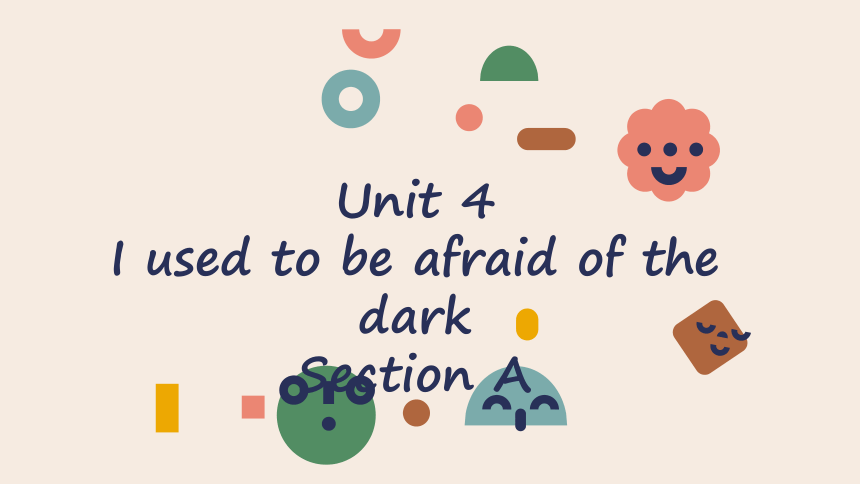 | |
| 格式 | pptx | ||
| 文件大小 | 1.6MB | ||
| 资源类型 | 教案 | ||
| 版本资源 | 人教新目标(Go for it)版 | ||
| 科目 | 英语 | ||
| 更新时间 | 2024-09-03 20:16:26 | ||
图片预览

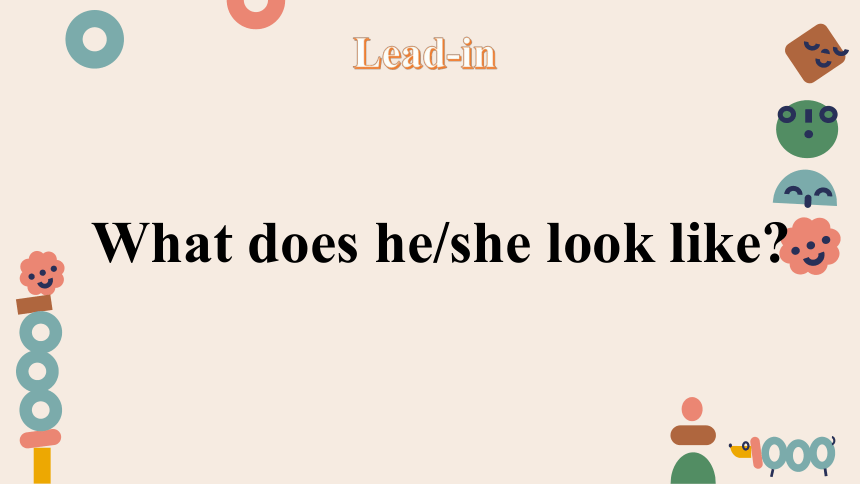
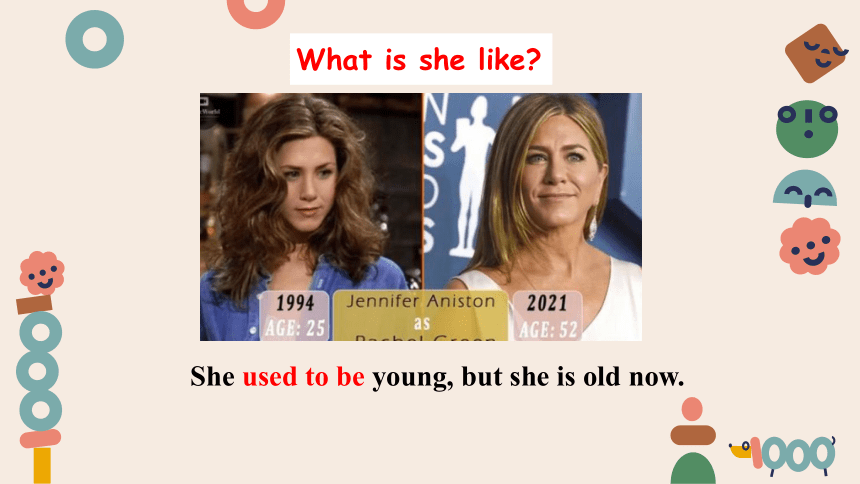
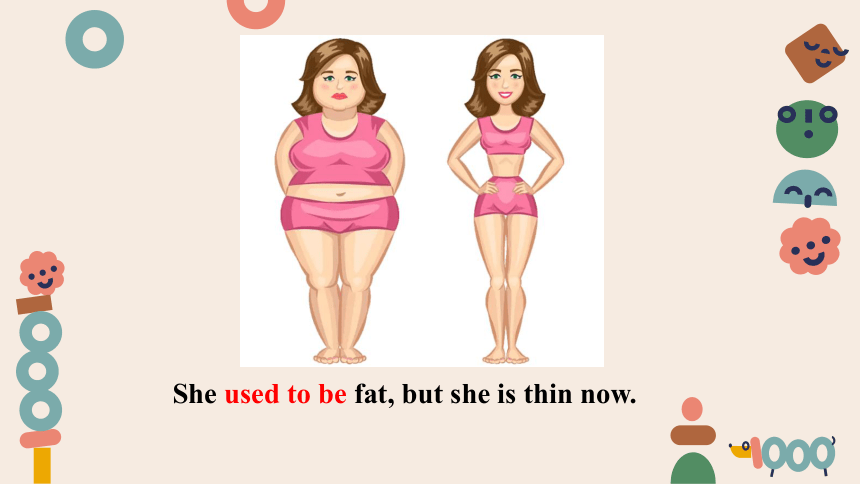

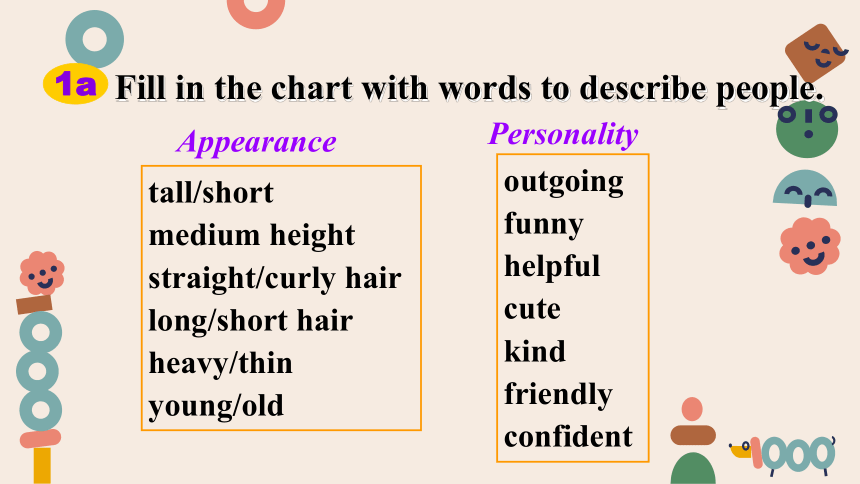
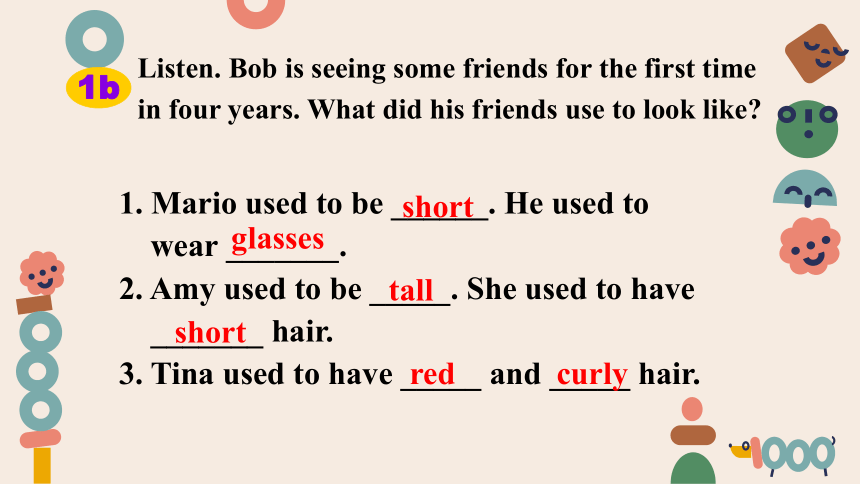
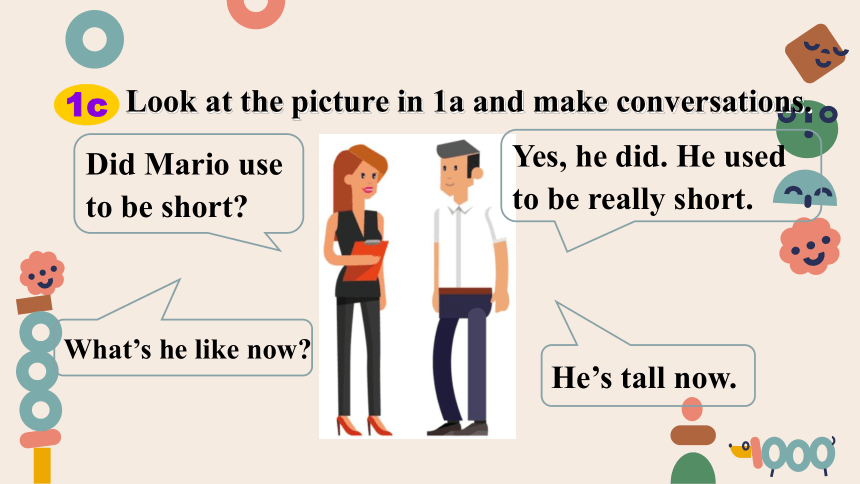
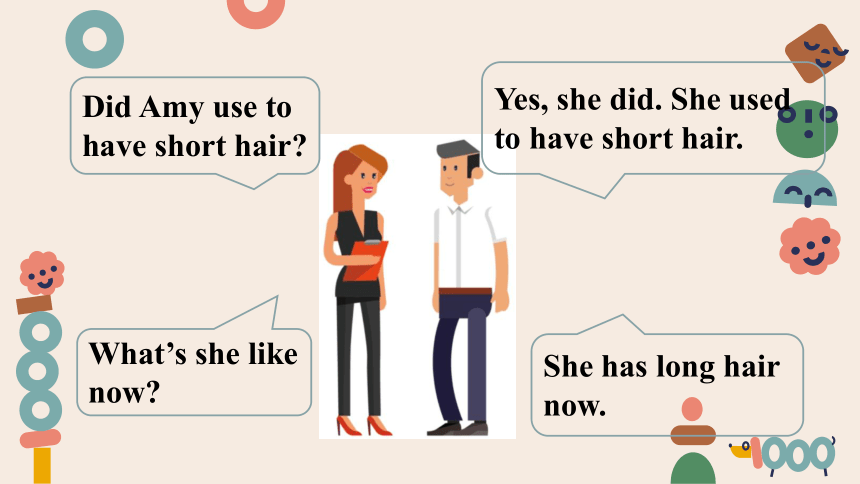

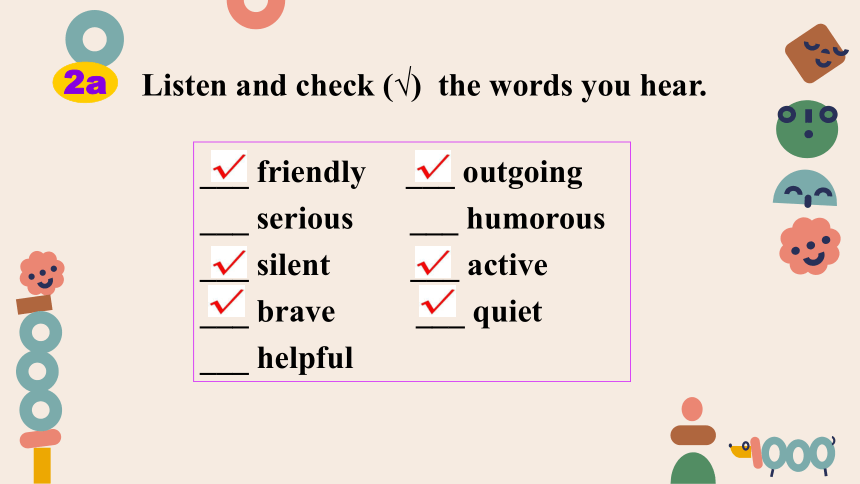
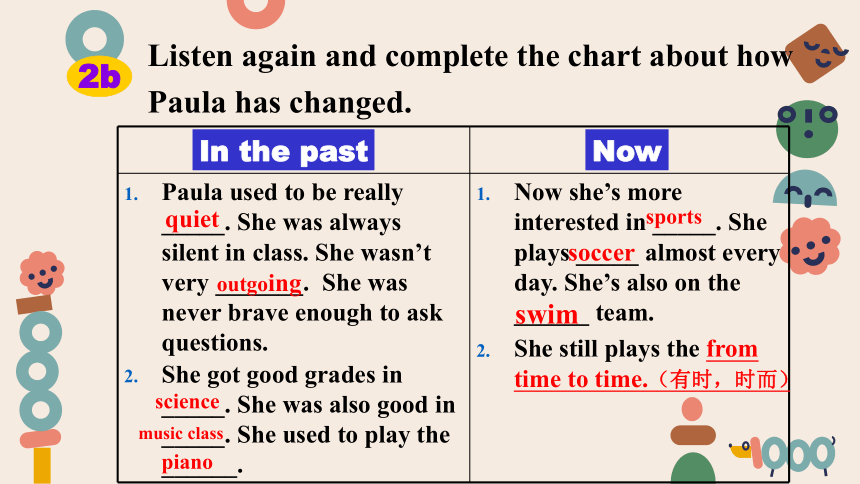
文档简介
(共56张PPT)
Unit 4
I used to be afraid of the dark
Section A
Lead-in
What does he/she look like
What is she like
She used to be young, but she is old now.
She used to be fat, but she is thin now.
What did you use to be like
I used to be…
short
thin
shy
quiet
friendly
I used to have…
short hair
straight hair
curly hair
brown hair
I used to …
1a
Fill in the chart with words to describe people.
Appearance
Personality
tall/short
medium height
straight/curly hair
long/short hair
heavy/thin
young/old
outgoing
funny
helpful
cute
kind
friendly
confident
1b
Listen. Bob is seeing some friends for the first time in four years. What did his friends use to look like
1. Mario used to be ______. He used to wear _______.
2. Amy used to be _____. She used to have _______ hair.
3. Tina used to have _____ and _____ hair.
short
glasses
tall
short
red
curly
1c
Look at the picture in 1a and make conversations.
Did Mario use to be short
What’s he like now
Yes, he did. He used to be really short.
He’s tall now.
Did Amy use to have short hair
Yes, she did. She used to have short hair.
What’s she like now
She has long hair now.
Did Tina use to have red hair
What’s she like now
Yes, she did. She used to have red and curly hair.
She has straight and blonde hair now.
2a
Listen and check (√) the words you hear.
___ friendly ___ outgoing
___ serious ___ humorous
___ silent ___ active
___ brave ___ quiet
___ helpful
2b
Listen again and complete the chart about how Paula has changed.
Paula used to be really _____. She was always silent in class. She wasn’t very _______. She was never brave enough to ask questions. She got good grades in _____. She was also good in _____. She used to play the ______. Now she’s more interested in _____. She plays _____ almost every day. She’s also on the ______ team.
She still plays the from time to time.(有时,时而)
In the past
Now
quiet
outgoing
science
music class
piano
sports
soccer
swim
Listen again and answer the questions.
1. What class were they
________________________________
2. What was Paula never brave to do in class
________________________________
________________________________
They were in science class.
She was never brave to ask questions to teachers.
3. What subjects were Paula good at
______________________________
4. What is Paula interested in now
______________________________
______________________________
Science and music.
Paula is more interested in sports now.
2c
Make conversations about Paula using the information in 2b.
Paula used to be really quiet.
I know. She was always silent in class.
2d
Role-play the conversation.
Alfred: This party is such a great idea!
Gina: I agree. It's been three years since we last saw our primary school classmates.
Alfred: It's interesting to see how people have changed.
Gina: Billy has changed so much! He used to be so shy and quiet.
Alfred: Yeah, his face always turned red when he talked to girls!
Gina: I used to see him reading in the library every day.
Alfred: That's because he was a really good student. He studied hard and got
good scores on his exams.
Gina: Did he use to wear glasses
Alfred: Yes, and he used to be thin, too. But look how big and strong he is now!
Gina: He's so popular now.
Language Points
1. Mario, you used to be short, didn't you 马里奥,你过去很矮,不是吗 。
要点精析 1
该句是一个反意疑问句。反意疑问句由两部分组成:前一部分是陈述句,后部分是简短的附加疑问句。陈述句部分若是肯定形式,附加疑问部分就用否定形式;陈述句部分若是否定形式,附加疑问部分就用肯定形式,即“前肯后否,前否后肯”。
例:Mary is verylazy,isn't she 玛丽很懒,不是吗
They were not late for the meeting, were they 他们开会没有迟到,是吗
对反意疑问句的回答,不管问题的提法如何,如果事实是肯定的,就要用yes;如果事实是否定的,就要用no;如果反意疑问的陈述句部分含有否定意义的词(no,never,nothing,few,hardly
little等)附加疑问部分要用肯定形式
例: There is little water in the glass, is there 玻璃杯里几乎没有水,是吗
祈使句的反意疑问句,一般附加疑问部分用will you;而以lets开头的祈使句其附加疑问部分用shall we。
例: Come here earlier next time,will you 下次早点儿来这儿,好吗
Let's have a rest, shall we 让我们休息一下,好吗
方法技巧
反意疑问句的回答
回答反意疑问句,答案含义是依据
肯定事实用yes,否定事实用no
2. It's been three years since we last saw our primary school classmates.
自从上次我们见到我们的小学同学以来已经有三年的时间了
要点精析 1
“It's been+一段时间+since+从句”意为“自从......以来已经有多长时间了”还可
表示为“It is+一段时间+ since+从句”。
例: It has been five years since I began to learn English. =It's five years since I began to learn English.自从我开始学英语已经有5年的时间了
要点精析 2
此句为现在完成时的句子。现在完成时常与 since引导的以某一时间为起点的时间状语或 for引导的一段时间连用,谓语动词要用延续性动词
例:She has lived in Beijing since 1998.她从1998年起就住在北京
We have known each other for five years.我们已经认识彼此5年了。
3. Now she's not shy anymore and loves singing in front of crowds.现在她不再害羞,并且喜欢在观众面前唱歌
要点精析
not...anymore 意为“不再......”,其同义短语有 no more,not...any longer, no longer.
例:He isn't a teacher anymore.他不再是一位老师了
辨析 not...any more 与 not...any longer
not...any more(=no more) 多指数量和程度上“不再”常修饰非延续性动词。常
用于将来时态
not...any longer(=no longer)表示时间上或距离的“不再”,常修饰延续性动词
常用于现在时态
例: He will no more go there.他将不再去那里了
3a
Read the article and identify the paragraphs in which the following information appears. Number the information(1-3).
______ how Candy’s life has changed
______ Candy’s advice to young people
______ Candy’s background
2
3
1
3b
Read the article again and complete the sentences about Candy.
She used to be shy, but now she’s not shy __________________________________.
She didn’t used to be __________ in school, but now she gets lots of attention.
She used to ____________ with friends, but now it is almost impossible.
She didn’t use to ____________ how she appears to others, but now she does.
and loves singing in front of the class
popular
hang out
worry about
1. Candy told me that she used to be really shy and took up singing to deal with her shyness.
take up 开始从事某事;以某事作为消遣或爱好;
占据(某空间或时间)
e.g. The table takes up too much room.
这桌子太占地方了。
They have taken up (playing) golf.
他们开始学起打高尔夫球了。
Language Points
Language Points
拓展:take相关词组
take off 起飞;脱下
take down 记下;取下
take place 发生;进行
take a look 看一下
take/have a walk 散步
take away 带走,拿走,取走
take care of 照顾;
Language Points
2. … she dared to sing in front of her class, ....
dare
敢于
情态动词
实义动词
2.常用于否定句和疑问句 dare not do sth.
How dare sb. do sth.
1.+ v. 原形
1.+ to do (不定式)
2.用于任意句,有人称时态的变化
dares daring dared dared
Language Points
3. You really require a lot of talent and hard work to succeed.
require
①require sb. to do sth. 要求某人做某事
They required us to carry out the plan.
②require sth. 需要某物
All living beings require food.
③ sth. require doing 某物需要被……
The house requires painting.
Language Points
4. Only a very small number of people make it to the top.
a number of 表示“许多;大量”,修饰可数名词。a number of…结构作主语时,谓语动词用复数形式。
the number of 表示“……的数量”,修饰可数名词。the number of…结构作主语时,谓语动词用单数形式。
Language Points
5. Only a very small number of people make it to the top.
make it 在口语当中相当于 succeed,表示“成功、做到、说定、赶上、及时到达”
I will never make it to a morning class.
早上的课程我总是来不及去上。
I wondered if I would make it to the other side.
我怀疑自己是否能跑到对面。
It's hard to make it to the top in show business.
在演艺界,想登上顶峰是很困难的。
Grammar Focus
used to是一个固定结构,它的意思是“过去经常、以前常常”,它的后面用动词原形,它表示过去存在某种状态或者过去的某种经常性、习惯性的行为或者动作,并意味着这种动作目前已经不存在,所以它只能用一般过去时,不能用现在时态。
used to + do sth.
“过去常常”表示过去习惯性的动作或状态,但如今已不存在。
肯定句式:
主语+ used to +动词原形...
例如:
I used to go to the cinema, but I never
have time now.
Used to do sth 过去(常常做某事)
主语+used to+动词原形
I used to smoke a lot.
She used to work in a shop.
Tom used to be a policeman.
He used to watch a lot of TV.
She used to be married.
否定句式:
A)主语+did not use to +动词原形......
He did not use to swim in this river,
but he swims here now.
B)主语+used not to +动词原形......
第一种否定句型,就是把used当作实义动词来看,所以变否定句要用助动词did;第二种否定句是把used当作情态动词,变否定句直接在used后面加not即可,used not 可以缩写成usedn’t或usen’t。美式英语通常用A种形式,英式英语常用B种形式。例如:
You didn't use to drink.
Used to 的否定形式
Didn’t use to do sth
used not to do sth
I used to smoke a lot
I didn’t used to smoke a lot.
I used not to smoke a lot.
疑问句:
A) Did +主语 +use to +动词原形...?
B) Used +主语+ to +动词原形...?美式英语通常用A种形式,英式英语用B种形式。例如:
Did you use to go swimming in the river when you were young
Used to 的一般疑问句形式
She used to smoke a lot.
Did she use to smoke a lot
Used she to smoke a lot
Did your sister use to be quiet
Used to 的反义疑问句
主语+used to do sth, didn’t +主语?
used not+主语?
I used to be a teacher, didn’t you
used not you
He used to watch a lot of TV, didn’t he
used not he
(四) used to 的状语可以用副词always,often,sometimes等,但是仍然是过去的习惯,不是指现在的习惯,所以不能用一般现在时。
例如:He always used to be late for class.
他过去常常上课迟到。
(五) used to可以用在there be结构中表示“过去经常有”的意思。
There used to be
There used to be a lot of teachers in the school.
100 years ago, there used to be a beautiful village
in the country
There used to be a clever old man in the village.
(六) used to 用于省略句时,肯定式保留
to,否定式不保留to。
例如:
—Used you to play basketball ——你过去常打篮球吗?
—Yes, I used to. (No, I usedn't.)
Sb used to do /be 某人过去常常做/过去是……
Sb be (get) used to doing sth. 某人习惯于做…….
Sth be used to do/for doing sth. 某物被用于做……
would/used to相同点
would与used to都可用来表示过去经常性或习惯性的动作,常常可以换用。如:
1. When we were boys we used to/would go swimming every summer.
小时候,每到夏天我们都要去游泳。
2. He used to/would spend every penny he
earned on books.
过去,他通常把挣来的钱全花在买书上。
would与used to的区别主要有以下几点:
a. used to可指过去的状态或情况,would则不能。如:
School children used to know the story of how Abraham Lincoln walked five miles to return a penny he'd overcharged a customer.
(不能用would)
Yet, he cannot but remember as it used to be.
(不能用would).
b. would表示反复发生的动作。如果某一动
作没有反复性,就不能用 would,只能用
used to。例如:
And from that day on, as soon as the table
was cleared and the dishes were gone, Mother
would disappear into her sewing room to
practice.
(具有反复性)
I used to live in Beijing.
(没有反复性)
c. used to表示过去经常性或习惯性的动作
或状态现在已经结束,would则表示有
可能再发生。如:
People used to believe that the earth was flat.
(现在已不再这样认为)
He would go to the park as soon as he was free.
(现在有可能再去)
Write sentences about the past using used to.
4a
Grace / watch a lot of TV / watch a
lot of movies
Grace used to watch a lot of TV. She didn’t
use to watch a lot of movies.
2. my mom / have curly hair / have straight hair
_____________________________________
_____________________________________
My mom used to have curly hair. She didn’t
use to have straight hair.
3. Jerry / read books on European history /
read books on African culture
_____________________________________
_____________________________________
4. Sandy / teach British English / teach American English
_____________________________________
_____________________________________
Jerry used to read books on European history.
He didn’t use to read books on African culture.
Sandy used to teach British English. She didn’t
use to teach American English.
4b
look at the information and write sentences about Emily.
Five years ago Now
didn’t eat a lot of vegetables loves carrots and tomatoes
listened to pop music enjoys country music
watched scary movies hates scary movies
didn’t read a lot of books reads at least six books a year.
e.g. Emily didn’t use to eat a lot of vegetables, but now she loves carrots and tomatoes. Which of these things did you use to be
afraid of Which ones are you still afraid of
Check the boxes and then ask your partner.
4c
Me I used to be afraid of… I’m still afraid of…
The dark
Being alone
flying
High places
giving a speech in public
My partner My partner used to be afraid of… My partner is still afraid of…
The dark
Being alone
flying
High places
giving a speech in public
Vocabulary
1. funny
指人或事滑稽可笑,常用来作定语或表语。其比较级和最高级形式分别为funnier,funniest。
funny的名词形式是fun
have fun doing sth.做某事很开心/高兴
make fun of 嘲弄......
练习:He told us some ________ stories.
funny
Vocabulary
2. turn
相当于pass。其中 past为介词,意为“经过”
练习:When autumn comes, the leaves on the tree ________ yellow.
turn
Vocabulary
3. take up
指开始某项工作、某种爱好,尤其指做以前未做过的事。take up doing sth.意为“开始做某事”
练习:He ________ up learning English at the age of forty.
took
Vocabulary
4. deal
同义短语为do with
deal with 常和 how连用,how 作deal with 的状语;do with常和what连用,what作do的宾语
练习:Have you ________ with these letters yet
dealt
Vocabulary
5. able
ability名词意为“能力”。be able to意为“能,会”
练习:He is a very ________ businessman.
able
Unit 4
I used to be afraid of the dark
Section A
Lead-in
What does he/she look like
What is she like
She used to be young, but she is old now.
She used to be fat, but she is thin now.
What did you use to be like
I used to be…
short
thin
shy
quiet
friendly
I used to have…
short hair
straight hair
curly hair
brown hair
I used to …
1a
Fill in the chart with words to describe people.
Appearance
Personality
tall/short
medium height
straight/curly hair
long/short hair
heavy/thin
young/old
outgoing
funny
helpful
cute
kind
friendly
confident
1b
Listen. Bob is seeing some friends for the first time in four years. What did his friends use to look like
1. Mario used to be ______. He used to wear _______.
2. Amy used to be _____. She used to have _______ hair.
3. Tina used to have _____ and _____ hair.
short
glasses
tall
short
red
curly
1c
Look at the picture in 1a and make conversations.
Did Mario use to be short
What’s he like now
Yes, he did. He used to be really short.
He’s tall now.
Did Amy use to have short hair
Yes, she did. She used to have short hair.
What’s she like now
She has long hair now.
Did Tina use to have red hair
What’s she like now
Yes, she did. She used to have red and curly hair.
She has straight and blonde hair now.
2a
Listen and check (√) the words you hear.
___ friendly ___ outgoing
___ serious ___ humorous
___ silent ___ active
___ brave ___ quiet
___ helpful
2b
Listen again and complete the chart about how Paula has changed.
Paula used to be really _____. She was always silent in class. She wasn’t very _______. She was never brave enough to ask questions. She got good grades in _____. She was also good in _____. She used to play the ______. Now she’s more interested in _____. She plays _____ almost every day. She’s also on the ______ team.
She still plays the from time to time.(有时,时而)
In the past
Now
quiet
outgoing
science
music class
piano
sports
soccer
swim
Listen again and answer the questions.
1. What class were they
________________________________
2. What was Paula never brave to do in class
________________________________
________________________________
They were in science class.
She was never brave to ask questions to teachers.
3. What subjects were Paula good at
______________________________
4. What is Paula interested in now
______________________________
______________________________
Science and music.
Paula is more interested in sports now.
2c
Make conversations about Paula using the information in 2b.
Paula used to be really quiet.
I know. She was always silent in class.
2d
Role-play the conversation.
Alfred: This party is such a great idea!
Gina: I agree. It's been three years since we last saw our primary school classmates.
Alfred: It's interesting to see how people have changed.
Gina: Billy has changed so much! He used to be so shy and quiet.
Alfred: Yeah, his face always turned red when he talked to girls!
Gina: I used to see him reading in the library every day.
Alfred: That's because he was a really good student. He studied hard and got
good scores on his exams.
Gina: Did he use to wear glasses
Alfred: Yes, and he used to be thin, too. But look how big and strong he is now!
Gina: He's so popular now.
Language Points
1. Mario, you used to be short, didn't you 马里奥,你过去很矮,不是吗 。
要点精析 1
该句是一个反意疑问句。反意疑问句由两部分组成:前一部分是陈述句,后部分是简短的附加疑问句。陈述句部分若是肯定形式,附加疑问部分就用否定形式;陈述句部分若是否定形式,附加疑问部分就用肯定形式,即“前肯后否,前否后肯”。
例:Mary is verylazy,isn't she 玛丽很懒,不是吗
They were not late for the meeting, were they 他们开会没有迟到,是吗
对反意疑问句的回答,不管问题的提法如何,如果事实是肯定的,就要用yes;如果事实是否定的,就要用no;如果反意疑问的陈述句部分含有否定意义的词(no,never,nothing,few,hardly
little等)附加疑问部分要用肯定形式
例: There is little water in the glass, is there 玻璃杯里几乎没有水,是吗
祈使句的反意疑问句,一般附加疑问部分用will you;而以lets开头的祈使句其附加疑问部分用shall we。
例: Come here earlier next time,will you 下次早点儿来这儿,好吗
Let's have a rest, shall we 让我们休息一下,好吗
方法技巧
反意疑问句的回答
回答反意疑问句,答案含义是依据
肯定事实用yes,否定事实用no
2. It's been three years since we last saw our primary school classmates.
自从上次我们见到我们的小学同学以来已经有三年的时间了
要点精析 1
“It's been+一段时间+since+从句”意为“自从......以来已经有多长时间了”还可
表示为“It is+一段时间+ since+从句”。
例: It has been five years since I began to learn English. =It's five years since I began to learn English.自从我开始学英语已经有5年的时间了
要点精析 2
此句为现在完成时的句子。现在完成时常与 since引导的以某一时间为起点的时间状语或 for引导的一段时间连用,谓语动词要用延续性动词
例:She has lived in Beijing since 1998.她从1998年起就住在北京
We have known each other for five years.我们已经认识彼此5年了。
3. Now she's not shy anymore and loves singing in front of crowds.现在她不再害羞,并且喜欢在观众面前唱歌
要点精析
not...anymore 意为“不再......”,其同义短语有 no more,not...any longer, no longer.
例:He isn't a teacher anymore.他不再是一位老师了
辨析 not...any more 与 not...any longer
not...any more(=no more) 多指数量和程度上“不再”常修饰非延续性动词。常
用于将来时态
not...any longer(=no longer)表示时间上或距离的“不再”,常修饰延续性动词
常用于现在时态
例: He will no more go there.他将不再去那里了
3a
Read the article and identify the paragraphs in which the following information appears. Number the information(1-3).
______ how Candy’s life has changed
______ Candy’s advice to young people
______ Candy’s background
2
3
1
3b
Read the article again and complete the sentences about Candy.
She used to be shy, but now she’s not shy __________________________________.
She didn’t used to be __________ in school, but now she gets lots of attention.
She used to ____________ with friends, but now it is almost impossible.
She didn’t use to ____________ how she appears to others, but now she does.
and loves singing in front of the class
popular
hang out
worry about
1. Candy told me that she used to be really shy and took up singing to deal with her shyness.
take up 开始从事某事;以某事作为消遣或爱好;
占据(某空间或时间)
e.g. The table takes up too much room.
这桌子太占地方了。
They have taken up (playing) golf.
他们开始学起打高尔夫球了。
Language Points
Language Points
拓展:take相关词组
take off 起飞;脱下
take down 记下;取下
take place 发生;进行
take a look 看一下
take/have a walk 散步
take away 带走,拿走,取走
take care of 照顾;
Language Points
2. … she dared to sing in front of her class, ....
dare
敢于
情态动词
实义动词
2.常用于否定句和疑问句 dare not do sth.
How dare sb. do sth.
1.+ v. 原形
1.+ to do (不定式)
2.用于任意句,有人称时态的变化
dares daring dared dared
Language Points
3. You really require a lot of talent and hard work to succeed.
require
①require sb. to do sth. 要求某人做某事
They required us to carry out the plan.
②require sth. 需要某物
All living beings require food.
③ sth. require doing 某物需要被……
The house requires painting.
Language Points
4. Only a very small number of people make it to the top.
a number of 表示“许多;大量”,修饰可数名词。a number of…结构作主语时,谓语动词用复数形式。
the number of 表示“……的数量”,修饰可数名词。the number of…结构作主语时,谓语动词用单数形式。
Language Points
5. Only a very small number of people make it to the top.
make it 在口语当中相当于 succeed,表示“成功、做到、说定、赶上、及时到达”
I will never make it to a morning class.
早上的课程我总是来不及去上。
I wondered if I would make it to the other side.
我怀疑自己是否能跑到对面。
It's hard to make it to the top in show business.
在演艺界,想登上顶峰是很困难的。
Grammar Focus
used to是一个固定结构,它的意思是“过去经常、以前常常”,它的后面用动词原形,它表示过去存在某种状态或者过去的某种经常性、习惯性的行为或者动作,并意味着这种动作目前已经不存在,所以它只能用一般过去时,不能用现在时态。
used to + do sth.
“过去常常”表示过去习惯性的动作或状态,但如今已不存在。
肯定句式:
主语+ used to +动词原形...
例如:
I used to go to the cinema, but I never
have time now.
Used to do sth 过去(常常做某事)
主语+used to+动词原形
I used to smoke a lot.
She used to work in a shop.
Tom used to be a policeman.
He used to watch a lot of TV.
She used to be married.
否定句式:
A)主语+did not use to +动词原形......
He did not use to swim in this river,
but he swims here now.
B)主语+used not to +动词原形......
第一种否定句型,就是把used当作实义动词来看,所以变否定句要用助动词did;第二种否定句是把used当作情态动词,变否定句直接在used后面加not即可,used not 可以缩写成usedn’t或usen’t。美式英语通常用A种形式,英式英语常用B种形式。例如:
You didn't use to drink.
Used to 的否定形式
Didn’t use to do sth
used not to do sth
I used to smoke a lot
I didn’t used to smoke a lot.
I used not to smoke a lot.
疑问句:
A) Did +主语 +use to +动词原形...?
B) Used +主语+ to +动词原形...?美式英语通常用A种形式,英式英语用B种形式。例如:
Did you use to go swimming in the river when you were young
Used to 的一般疑问句形式
She used to smoke a lot.
Did she use to smoke a lot
Used she to smoke a lot
Did your sister use to be quiet
Used to 的反义疑问句
主语+used to do sth, didn’t +主语?
used not+主语?
I used to be a teacher, didn’t you
used not you
He used to watch a lot of TV, didn’t he
used not he
(四) used to 的状语可以用副词always,often,sometimes等,但是仍然是过去的习惯,不是指现在的习惯,所以不能用一般现在时。
例如:He always used to be late for class.
他过去常常上课迟到。
(五) used to可以用在there be结构中表示“过去经常有”的意思。
There used to be
There used to be a lot of teachers in the school.
100 years ago, there used to be a beautiful village
in the country
There used to be a clever old man in the village.
(六) used to 用于省略句时,肯定式保留
to,否定式不保留to。
例如:
—Used you to play basketball ——你过去常打篮球吗?
—Yes, I used to. (No, I usedn't.)
Sb used to do /be 某人过去常常做/过去是……
Sb be (get) used to doing sth. 某人习惯于做…….
Sth be used to do/for doing sth. 某物被用于做……
would/used to相同点
would与used to都可用来表示过去经常性或习惯性的动作,常常可以换用。如:
1. When we were boys we used to/would go swimming every summer.
小时候,每到夏天我们都要去游泳。
2. He used to/would spend every penny he
earned on books.
过去,他通常把挣来的钱全花在买书上。
would与used to的区别主要有以下几点:
a. used to可指过去的状态或情况,would则不能。如:
School children used to know the story of how Abraham Lincoln walked five miles to return a penny he'd overcharged a customer.
(不能用would)
Yet, he cannot but remember as it used to be.
(不能用would).
b. would表示反复发生的动作。如果某一动
作没有反复性,就不能用 would,只能用
used to。例如:
And from that day on, as soon as the table
was cleared and the dishes were gone, Mother
would disappear into her sewing room to
practice.
(具有反复性)
I used to live in Beijing.
(没有反复性)
c. used to表示过去经常性或习惯性的动作
或状态现在已经结束,would则表示有
可能再发生。如:
People used to believe that the earth was flat.
(现在已不再这样认为)
He would go to the park as soon as he was free.
(现在有可能再去)
Write sentences about the past using used to.
4a
Grace / watch a lot of TV / watch a
lot of movies
Grace used to watch a lot of TV. She didn’t
use to watch a lot of movies.
2. my mom / have curly hair / have straight hair
_____________________________________
_____________________________________
My mom used to have curly hair. She didn’t
use to have straight hair.
3. Jerry / read books on European history /
read books on African culture
_____________________________________
_____________________________________
4. Sandy / teach British English / teach American English
_____________________________________
_____________________________________
Jerry used to read books on European history.
He didn’t use to read books on African culture.
Sandy used to teach British English. She didn’t
use to teach American English.
4b
look at the information and write sentences about Emily.
Five years ago Now
didn’t eat a lot of vegetables loves carrots and tomatoes
listened to pop music enjoys country music
watched scary movies hates scary movies
didn’t read a lot of books reads at least six books a year.
e.g. Emily didn’t use to eat a lot of vegetables, but now she loves carrots and tomatoes. Which of these things did you use to be
afraid of Which ones are you still afraid of
Check the boxes and then ask your partner.
4c
Me I used to be afraid of… I’m still afraid of…
The dark
Being alone
flying
High places
giving a speech in public
My partner My partner used to be afraid of… My partner is still afraid of…
The dark
Being alone
flying
High places
giving a speech in public
Vocabulary
1. funny
指人或事滑稽可笑,常用来作定语或表语。其比较级和最高级形式分别为funnier,funniest。
funny的名词形式是fun
have fun doing sth.做某事很开心/高兴
make fun of 嘲弄......
练习:He told us some ________ stories.
funny
Vocabulary
2. turn
相当于pass。其中 past为介词,意为“经过”
练习:When autumn comes, the leaves on the tree ________ yellow.
turn
Vocabulary
3. take up
指开始某项工作、某种爱好,尤其指做以前未做过的事。take up doing sth.意为“开始做某事”
练习:He ________ up learning English at the age of forty.
took
Vocabulary
4. deal
同义短语为do with
deal with 常和 how连用,how 作deal with 的状语;do with常和what连用,what作do的宾语
练习:Have you ________ with these letters yet
dealt
Vocabulary
5. able
ability名词意为“能力”。be able to意为“能,会”
练习:He is a very ________ businessman.
able
同课章节目录
- Unit 1 How can we become good learners.
- Section A
- Section B
- Unit 2 I think that mooncakes are delicious!
- Section A
- Section B
- Unit 3 Could you please tell me where the restroom
- Section A
- Section B
- Unit 4 I used to be afraid of the dark.
- Section A
- Section B
- Unit 5 What are the shirts made of?
- Section A
- Section B
- Review of Units 1-5
- Unit 6 When was it invented?
- Section A
- Section B
- Unit 7 Teenagers should be allowed to choose their
- Section A
- Section B
- Unit 8 It must belong to Carla.
- Section A
- Section B
- Unit 9 I like music that I can dance to.
- Section A
- Section B
- Unit 10 You're supposed to shake hands.
- Section A
- Section B
- Review of Units 6-10
- Unit 11 Sad movies make me cry.
- Section A
- Section B
- Unit 12 Life is full of the unexpected
- Section A
- Section B
- Unit 13 We're trying to save the earth!
- Section A
- Section B
- Unit 14 I remember meeting all of you in Grade 7.
- Section A
- Section B
- Review of Units 11-14
